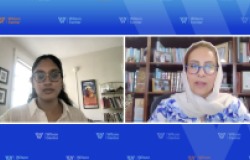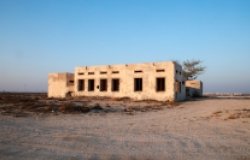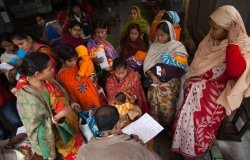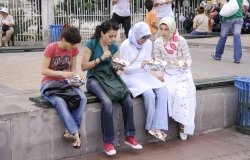Film Screening-- Documentary Studies on the Gender Implications of Poverty and Labor Migration in Russia and Tajikistan
Zuhra Halimova, Executive Director, Tajik Branch, Open Society Institute; Nadezhda Azhgikhina, Executive Secretary, Russian Union of Journalists, Moscow; Phoebe Schreiner, Program Officer, Network Women's Program, New York, NY; Elena Vitenberg, Manager, Gender Montage Program, Institute for Social and Gender Policy, Moscow
Overview
Two films from the Gender Montage film series were shown at a recent Kennan Institute film screening. New Penelope is a film about the women left behind in Tajikistan when Tajik men travel abroad in search of work. They are forced to live in poverty and, in some cases, enter polygamous marriages to support themselves and their children. There are Women in Russian Villages is about a mother and a daughter who live in poverty in Russia after fleeing from domestic violence. They both work on a dairy farm. Most of the men in their village are drunkards.
Elena Vitenberg, the manager of the Gender Montage Program at the Institute for Social and Gender Policy in Moscow, introduced the films by saying that the Gender Montage film series was an international project that brought together film-makers and the analytical community in each of the seven countries depicted—Armenia, Georgia, Kyrgyzstan, Lithuania, Russia, Tajikistan, and Ukraine. The project sought out film-making crews from each of the countries so that they could fully capture the variety of experiences in their respective countries. In this way, according to Vitenberg, each film has its own national flavor while at the same time being part of a large-scale international project with universal themes.
Phoebe Schreiner, program officer at the Network Women's Program in New York, said that film is an especially effective medium to raise awareness, because movies touch people's hearts in a way other media cannot. Each movie shows individuals' stories up close, allowing viewers to identify with them, while the issues are universal and have a great deal of policy relevance, she said.
Zuhra Halimova, executive director of the Tajik Branch of the Open Society Institute, said that conditions are equally bad for both genders in Tajikistan. Men and women are divided by circumstances. Halimova said that remissions from labor migrants to Tajikistan are equal to twice the budget of the Tajik state. Because of poverty and a lack of access to information, she said, these funds are not invested, however, but are used for daily living. She noted that it is useful to show these films about Central Asian labor migrants in Russia, so that Russians better understand the difficulties migrants have to face while working in Russia.
Nadezhda Azhgikhina, executive secretary of the Russian Union of Journalists, highlighted the need to develop a new language to talk about these problems, because of the particularities of the situation of labor migrants in the post-Soviet countries. She added that these problems do not affect refugees alone, but also internal migrants within Russia. Gender issues are not only about women, she said, noting that it was precisely the gender issues of quality of life and poverty that the democratization agenda overlooked.
Hosted By

Kennan Institute
The Kennan Institute is the premier US center for advanced research on Russia and Eurasia and the oldest and largest regional program at the Woodrow Wilson International Center for Scholars. The Kennan Institute is committed to improving American understanding of Russia, Ukraine, Central Asia, the Caucasus, and the surrounding region though research and exchange. Read more
Thank you for your interest in this event. Please send any feedback or questions to our Events staff.









